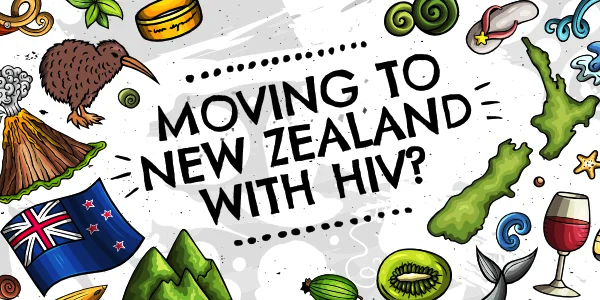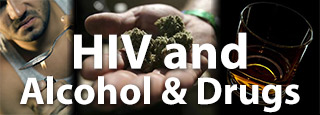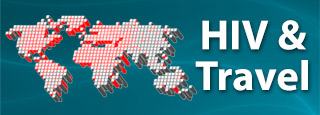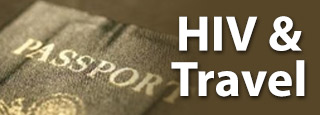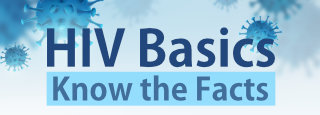HIV and Travel
With proper treatment, people living with HIV/AIDS lead full and active lives, including traveling for business and pleasure. However, there are many things to consider if you are planning a trip outside of New Zealand. It’s important to plan carefully to protect your health and safety.
Travelling around the world can involve new challenges and obstacles as many countries still restrict the entry, residence and stay of foreigners living with HIV/AIDS. This means that foreigners with HIV may be refused entry, denied permission to work or settle, or even be deported.
Quicklinks:
Tourist / Leisure Travel
If you are planning an overseas trip you must first check if the country you intend to visit has any entry restrictions for travellers living with HIV/AIDS, and if so, how this will effect your trip. A good place to start is to check the countries listed here.
As restrictions on entry and residence for HIV-positive individuals can change quickly and with very little notice, it is a good idea to also check the international travel database - www.hivtravel.org - before any travel arrangements are made.
Countries have been listed depending on their current entry restrictions for people living with HIV/AIDS:
IMPORTANT: Every attempt is taken to keep these lists up to date where possible. Should you notice anything that is not correct please contact us so that we can make the necessary changes.
IMPORTANT: Every attempt is taken to keep these lists up to date where possible. Should you notice anything that is not correct please contact us so that we can make the necessary changes.
Red
Countries with Extreme Travel Restrictions
These countries currently either do not permit people living with HIV/AIDS to enter or may require a special 'waiver' to be obtained before arrival. Some countries may also deport tourists/foreigners found to have HIV/AIDS.
Bahamas
Brunei
Egypt
Equatorial Guinea
Iraq
Jordan
Korea (South)
Papua New Guinea
Qatar
Russia
Saudi Arabia
Solomon Islands
Sudan
United Arab Emirates (UAE)
Uzbekistan
Yemen
Brunei
Egypt
Equatorial Guinea
Iraq
Jordan
Korea (South)
Papua New Guinea
Qatar
Russia
Saudi Arabia
Solomon Islands
Sudan
United Arab Emirates (UAE)
Uzbekistan
Yemen
Orange
Countries with Some Travel Restrictions
These countries may have restrictions for people living with HIV/AIDS depending on their length of stay and may require disclosure of HIV status or demand mandatory HIV testing even for short term stays.
Armenia
Bahrain
Bangladesh
Belarus
Bhutan
Bosnia Herzegovina
Canada
China
Cuba
Cyprus
Dominican Republic
Ecuador
Eritrea
Fiji
Germany
Honduras
Hungary
Iran
Israel
Kazakhstan
Korea (North)
Kuwait
Kyrgyzstan
Malaysia
Marshall Islands
Moldova
Mongolia
Montserrat
Nicaragua
Oman
Panama
Poland
Singapore
Slovakia
St. Kitts and Nevis
Suriname
Tadjikistan
Taiwan
Tonga
Tunisia
Turkmenistan
Turks and Caicos Islands
Ukraine
Bahrain
Bangladesh
Belarus
Bhutan
Bosnia Herzegovina
Canada
China
Cuba
Cyprus
Dominican Republic
Ecuador
Eritrea
Fiji
Germany
Honduras
Hungary
Iran
Israel
Kazakhstan
Korea (North)
Kuwait
Kyrgyzstan
Malaysia
Marshall Islands
Moldova
Mongolia
Montserrat
Nicaragua
Oman
Panama
Poland
Singapore
Slovakia
St. Kitts and Nevis
Suriname
Tadjikistan
Taiwan
Tonga
Tunisia
Turkmenistan
Turks and Caicos Islands
Ukraine
Green
Countries with Limited or No Restrictions
These countries do not currently have any laws, policies or known practices that deny entry to tourists/foreigners based solely on their HIV status.
Albania
Algeria
Andorra
Angola
Antigua and Barbuda
Argentina
Aruba
Australia
Austria
Azerbaidjan
Barbados
Belgium
Benin
Bolivia
Botswana
Brazil
Bulgaria
Burkina Faso
Burundi
Cabo Verde
Cambodia
Cameroon
Central African Republic
Chad
Chile
Colombia
Comores
Congo (Brazzaville)
Congo (Kinshasa)
Cook Islands
Costa Rica
Côte d'Ivoire (Ivory Coast)
Croatia
Czech Republic
Denmark
Djibouti
El Salvador
Estonia
Ethiopia
Finland
France
French Polynesia
Gabon
Gambia
Georgia
Ghana
Greece
Grenada
Guatemala
Guinea
Guinea Bissao
Guyana
Haiti
Hong Kong
Iceland
India
Indonesia
Ireland
Italy
Jamaica
Japan
Kenya
Kosovo
Laos
Latvia
Lebanon
Lesotho
Liberia
Libya
Liechtenstein
Lithuania
Luxembourg
Macedonia
Madagascar
Malawi
Maldives
Mali
Malta
Mauritania
Mauritius
Mexico
Micronesia
Monaco
Montenegro
Morocco
Mozambique
Myanmar (Burma)
Namibia
Nauru
Nepal
Netherlands
New Caledonia
New Zealand
Niger
Nigeria
Norway
Pakistan
Paraguay
Peru
Philippines
Portugal
Romania
Rwanda
Samoa
San Marino
Senegal
Serbia
Seychelles
Sierra Leone
Slovenia
Somalia
South Africa
Spain
Sri Lanka
St. Lucia
St. Vincent and Grenadines
Swaziland
Sweden
Switzerland
Syria
Tanzania
Thailand
Togo
Trinidad and Tobago
Turkey
Uganda
United Kingdom and Gibraltar
United States of America
Uruguay
Vanuatu
Vatican, Holy City
Venezuela
Vietnam
Virgin Islands
Zambia
Zimbabwe
Algeria
Andorra
Angola
Antigua and Barbuda
Argentina
Aruba
Australia
Austria
Azerbaidjan
Barbados
Belgium
Benin
Bolivia
Botswana
Brazil
Bulgaria
Burkina Faso
Burundi
Cabo Verde
Cambodia
Cameroon
Central African Republic
Chad
Chile
Colombia
Comores
Congo (Brazzaville)
Congo (Kinshasa)
Cook Islands
Costa Rica
Côte d'Ivoire (Ivory Coast)
Croatia
Czech Republic
Denmark
Djibouti
El Salvador
Estonia
Ethiopia
Finland
France
French Polynesia
Gabon
Gambia
Georgia
Ghana
Greece
Grenada
Guatemala
Guinea
Guinea Bissao
Guyana
Haiti
Hong Kong
Iceland
India
Indonesia
Ireland
Italy
Jamaica
Japan
Kenya
Kosovo
Laos
Latvia
Lebanon
Lesotho
Liberia
Libya
Liechtenstein
Lithuania
Luxembourg
Macedonia
Madagascar
Malawi
Maldives
Mali
Malta
Mauritania
Mauritius
Mexico
Micronesia
Monaco
Montenegro
Morocco
Mozambique
Myanmar (Burma)
Namibia
Nauru
Nepal
Netherlands
New Caledonia
New Zealand
Niger
Nigeria
Norway
Pakistan
Paraguay
Peru
Philippines
Portugal
Romania
Rwanda
Samoa
San Marino
Senegal
Serbia
Seychelles
Sierra Leone
Slovenia
Somalia
South Africa
Spain
Sri Lanka
St. Lucia
St. Vincent and Grenadines
Swaziland
Sweden
Switzerland
Syria
Tanzania
Thailand
Togo
Trinidad and Tobago
Turkey
Uganda
United Kingdom and Gibraltar
United States of America
Uruguay
Vanuatu
Vatican, Holy City
Venezuela
Vietnam
Virgin Islands
Zambia
Zimbabwe
Travelling with HIV Medication
The following are some tips to consider when travelling with HIV medication:
- Always carry your medication in your hand luggage - checked luggage might get lost or delayed.
- Always take some days of extra medication with you. You might not return as planned, for unforeseeable reasons. It is cumbersome to run after expensive prescription medication in a different country, and you might not even receive the drugs you are taking if in need.
- You may have to check specific customs regulation for importing your medication. In almost all cases, importing medicines for personal use would not pose a problem. To be on the safe side, carry a doctor’s prescription in English with you. The prescription should make no mention of HIV.
- Carry your medication in original packaging, labelled with your name.
- Do not disclose your HIV status unnecessarily. Not to other travellers, not to customs or immigration officials – it is not their business. Be aware that people with HIV are stigmatised in many countries.
- If you stay in a country for a longer period, or if your health is frail, make sure you know where the next HIV clinic is, or get the address of a clinician specialised in HIV. It might be a good idea to get in touch with a local HIV organisation.
- Always carry your medication in your hand luggage - checked luggage might get lost or delayed.
- Always take some days of extra medication with you. You might not return as planned, for unforeseeable reasons. It is cumbersome to run after expensive prescription medication in a different country, and you might not even receive the drugs you are taking if in need.
- You may have to check specific customs regulation for importing your medication. In almost all cases, importing medicines for personal use would not pose a problem. To be on the safe side, carry a doctor’s prescription in English with you. The prescription should make no mention of HIV.
- Carry your medication in original packaging, labelled with your name.
- Do not disclose your HIV status unnecessarily. Not to other travellers, not to customs or immigration officials – it is not their business. Be aware that people with HIV are stigmatised in many countries.
- If you stay in a country for a longer period, or if your health is frail, make sure you know where the next HIV clinic is, or get the address of a clinician specialised in HIV. It might be a good idea to get in touch with a local HIV organisation.
Most important: be aware that perceptions around HIV infection change from country to country. So if disclosure is safe in the country and community you normally live in, this might not be the case in the country you are visiting.
Visiting and Working in New Zealand:
Useful info for people living with HIV overseas who are considering relocating to New Zealand, visiting as a tourist or to working in New Zealand temporally:
As a Refugee
As a Refugee
A refugee is a person who has been forced to leave their country in order to escape war, persecution or a natural disaster. There are support services in New Zealand which can provide support in such a difficult situation. To find out about these, talk to your immigration lawyer/consultant/advocate or contact your local HIV/AIDS service organisation.
Refugees and all people applying to live in New Zealand must complete an Immigration Medical Exam (IME) which includes an HIV test. Refugee applicants living with HIV have the same rights as all other people in New Zealand. Your HIV status will not affect your application negatively. Tell a lawyer/consultant/advocate about your HIV status as soon as you can – they are required by law to keep everything you tell them confidential.
Quota refugees are New Zealand residents on arrival and have the same entitlements as all New Zealanders to publicly provided health and disability services, and to subsidised primary health care (Minister of Health Health 2003)
Many refugees get short-term health insurance called Refugee Medical Assistance (RMA). It is available for up to eight months.
Immigration rules frequently change so always check with INZ, a registered immigration consultant, lawyer or advisor for the latest requirements. Contact Immigration NZ (INZ) at 0508 558 855 or immigration.govt.nz to get detailed information about applying.
Refugees and all people applying to live in New Zealand must complete an Immigration Medical Exam (IME) which includes an HIV test. Refugee applicants living with HIV have the same rights as all other people in New Zealand. Your HIV status will not affect your application negatively. Tell a lawyer/consultant/advocate about your HIV status as soon as you can – they are required by law to keep everything you tell them confidential.
Quota refugees are New Zealand residents on arrival and have the same entitlements as all New Zealanders to publicly provided health and disability services, and to subsidised primary health care (Minister of Health Health 2003)
Many refugees get short-term health insurance called Refugee Medical Assistance (RMA). It is available for up to eight months.
Immigration rules frequently change so always check with INZ, a registered immigration consultant, lawyer or advisor for the latest requirements. Contact Immigration NZ (INZ) at 0508 558 855 or immigration.govt.nz to get detailed information about applying.
For more information about the support services available in NZ for people living with HIV see the following organisations:
Body Positive Inc.
0800 448 5463
bodypositive.org.nz
ALAC
Aotearoa Latin American Community Inc
09 636 5313
alacinc.org.nz
Positive Women
0800 769 848
positivewomen.org.nz
0800 448 5463
bodypositive.org.nz
ALAC
Aotearoa Latin American Community Inc
09 636 5313
alacinc.org.nz
Positive Women
0800 769 848
positivewomen.org.nz
Burnett Foundation Aotearoa
0800 802 437
burnettfoundation.org.nz
Rainbow Path
rainbowpathnz.com
RASNZ Refugee Health and Wellbeing
rasnz.co.nz
0800 802 437
burnettfoundation.org.nz
Rainbow Path
rainbowpathnz.com
RASNZ Refugee Health and Wellbeing
rasnz.co.nz
As an International Student
As an International Student
An international student is a person who comes to New Zealand with a student visa for education. A student visa is subject to conditions for renewal. If you want to extend your study, check the expiry date on your visa and make sure you apply before that date. Full fee paying students don’t usually need to provide a medical certificate, however you may need a chest x-ray if from a country where tuberculosis is present.
NZ immigration law includes rules that may directly impact you if your health care costs are higher than the average New Zealander. You can find detailed information about these rules and how they affect people living with HIV on the NZ Immigration website or through a registered immigration lawyer, consultant or advocate.
Most international students will need to purchase health insurance in New Zealand as they are not covered under the national healthcare system. All HIV medication and related healthcare is free to anyone legally in NZ. PHD students do not need health insurance as they have access to the National Health System.
Immigration rules frequently change so always check with INZ, a registered immigration consultant, lawyer or advisor for the latest requirements. Contact Immigration NZ (INZ) at 0508 558 855 or immigration.govt.nz to get detailed information about applying.
NZ immigration law includes rules that may directly impact you if your health care costs are higher than the average New Zealander. You can find detailed information about these rules and how they affect people living with HIV on the NZ Immigration website or through a registered immigration lawyer, consultant or advocate.
Most international students will need to purchase health insurance in New Zealand as they are not covered under the national healthcare system. All HIV medication and related healthcare is free to anyone legally in NZ. PHD students do not need health insurance as they have access to the National Health System.
Immigration rules frequently change so always check with INZ, a registered immigration consultant, lawyer or advisor for the latest requirements. Contact Immigration NZ (INZ) at 0508 558 855 or immigration.govt.nz to get detailed information about applying.
For more information about the support services available in NZ for people living with HIV see the following organisations:
Body Positive Inc.
0800 448 5463
bodypositive.org.nz
ALAC
Aotearoa Latin American Community Inc
09 636 5313
alacinc.org.nz
0800 448 5463
bodypositive.org.nz
ALAC
Aotearoa Latin American Community Inc
09 636 5313
alacinc.org.nz
Burnett Foundation Aotearoa
0800 802 437
burnettfoundation.org.nz
Positive Women
0800 769 848
positivewomen.org.nz
0800 802 437
burnettfoundation.org.nz
Positive Women
0800 769 848
positivewomen.org.nz
As a Temporary Worker
As a Temporary Worker
A temporary worker is a person who is hired to fill temporary labour and skill shortages.
You can visit New Zealand as a tourist without any restrictions, and obtaining a work visa is possible if the duration of the work visa is not more than 12 months.
Work Visa applications with a duration longer than 12 months will require an immigration medical, and part of this medical check does include a test for HIV. Prior to 2021 a positive result meant that the visa application would be automatically declined, however in October 2021 HIV was removed from the list of medical conditions deemed “likely to impose significant costs or demands” on the health services. This means that each visa applicant with HIV will now be assessed on a “case by case” basis.
If the person living with HIV is in a ‘long term stable relationship’ with a New Zealand citizen, they are granted an automatic medical waiver for their HIV status so that it is no longer a factor in their visa or residency application.
You may be eligible for health coverage through the government. However, if you do not qualify, your health coverage can be paid for either through your employer or private insurance that you purchase. If you do not have either of these, you may have to pay for health care and medication yourself.
Everybody in New Zealand, regardless if you are a citizen/resident, on a temporary work/study visa or even a tourist visa, receives the same care and treatment for HIV, free of charge.
When travelling to New Zealand, we recommend you bring as much of your current HIV medication with you as you can. Once this runs out you will be able to obtain further medication for the duration of your stay free of charge via the public health system (please note that NZ lags behind other countries with access to some newer HIV medications, so there is a chance that you may need to switch to a different combination of drugs when here, if the combination you currently take isn't available - List of HIV Medications Funded in New Zealand)
Your HIV status may affect your application to work in NZ. NZ immigration law includes rules that may directly impact you if your health care costs are higher than the average New Zealander. You can find detailed information about these rules and how they affect people living with HIV on the NZ Immigration website or through a registered immigration lawyer, consultant or advocate.
Immigration rules frequently change so always check with INZ, a registered immigration consultant, lawyer or advisor for the latest requirements. Contact Immigration NZ (INZ) at 0508 558 855 or immigration.govt.nz to get detailed information about applying.
You can visit New Zealand as a tourist without any restrictions, and obtaining a work visa is possible if the duration of the work visa is not more than 12 months.
Work Visa applications with a duration longer than 12 months will require an immigration medical, and part of this medical check does include a test for HIV. Prior to 2021 a positive result meant that the visa application would be automatically declined, however in October 2021 HIV was removed from the list of medical conditions deemed “likely to impose significant costs or demands” on the health services. This means that each visa applicant with HIV will now be assessed on a “case by case” basis.
If the person living with HIV is in a ‘long term stable relationship’ with a New Zealand citizen, they are granted an automatic medical waiver for their HIV status so that it is no longer a factor in their visa or residency application.
You may be eligible for health coverage through the government. However, if you do not qualify, your health coverage can be paid for either through your employer or private insurance that you purchase. If you do not have either of these, you may have to pay for health care and medication yourself.
Everybody in New Zealand, regardless if you are a citizen/resident, on a temporary work/study visa or even a tourist visa, receives the same care and treatment for HIV, free of charge.
When travelling to New Zealand, we recommend you bring as much of your current HIV medication with you as you can. Once this runs out you will be able to obtain further medication for the duration of your stay free of charge via the public health system (please note that NZ lags behind other countries with access to some newer HIV medications, so there is a chance that you may need to switch to a different combination of drugs when here, if the combination you currently take isn't available - List of HIV Medications Funded in New Zealand)
Your HIV status may affect your application to work in NZ. NZ immigration law includes rules that may directly impact you if your health care costs are higher than the average New Zealander. You can find detailed information about these rules and how they affect people living with HIV on the NZ Immigration website or through a registered immigration lawyer, consultant or advocate.
Immigration rules frequently change so always check with INZ, a registered immigration consultant, lawyer or advisor for the latest requirements. Contact Immigration NZ (INZ) at 0508 558 855 or immigration.govt.nz to get detailed information about applying.
For more information about the support services available in NZ for people living with HIV see the following organisations:
Body Positive Inc.
0800 448 5463
bodypositive.org.nz
ALAC
Aotearoa Latin American Community Inc
09 636 5313
alacinc.org.nz
0800 448 5463
bodypositive.org.nz
ALAC
Aotearoa Latin American Community Inc
09 636 5313
alacinc.org.nz
Burnett Foundation Aotearoa
0800 802 437
burnettfoundation.org.nz
Positive Women
0800 769 848
positivewomen.org.nz
0800 802 437
burnettfoundation.org.nz
Positive Women
0800 769 848
positivewomen.org.nz
As a Visitor
As a Visitor
A visitor is a person who comes from outside of New Zealand to visit as a tourist or for business. This is for a pre-determined period of time. As a visitor to NZ, you may not be entitled to public health care coverage. If you are living with HIV and need advice about accessing medical care, please contact us.
You can visit New Zealand as a tourist without any restrictions, and obtaining a work visa is possible if the duration of the work visa is not more than 12 months.
Work Visa applications with a duration longer than 12 months will require an immigration medical, and part of this medical check does include a test for HIV. Prior to 2021 a positive result meant the visa application would be automatically declined, however in October 2021 HIV was removed from the list of medical conditions deemed “likely to impose significant costs or demands” on the health services. This means that each visa applicant with HIV will now be assessed on a “case by case” basis.
If the person living with HIV is in a ‘long term stable relationship’ with a New Zealand citizen, they are granted an automatic medical waiver for their HIV status so that it is no longer a factor in their visa or residency application.
Everybody in New Zealand, regardless if you are a citizen/resident, on a temporary work/study visa or even a tourist visa, receives the same care and treatment for HIV, free of charge.
When travelling to New Zealand, we recommend you bring as much of your current HIV medication with you as you can. Once this runs out you will be able to obtain further medication for the duration of your stay free of charge via the public health system (please note that NZ lags behind other countries with access to some newer HIV medications, so there is a chance that you may need to switch to a different combination of drugs when here, if the combination you currently take isn't available - List of HIV Medications Funded in New Zealand)
Whether or not you are living with HIV, you can go to a hospital emergency room if you need urgent medical care. Hospitals are required to admit you if your life is in danger. If you do not have the appropriate visa, you will be billed for hospital services provided
You can also contact the Body Positive to speak to someone, be referred to a registered immigration advisor or find an AIDS service organisation (ASO) near you. For information 0800 448 5463 in English.
Immigration rules frequently change so always check with INZ, a registered immigration consultant, lawyer or advisor for the latest requirements. Contact Immigration NZ (INZ) at 0508 558 855 or immigration.govt.nz to get detailed information about applying.
You can visit New Zealand as a tourist without any restrictions, and obtaining a work visa is possible if the duration of the work visa is not more than 12 months.
Work Visa applications with a duration longer than 12 months will require an immigration medical, and part of this medical check does include a test for HIV. Prior to 2021 a positive result meant the visa application would be automatically declined, however in October 2021 HIV was removed from the list of medical conditions deemed “likely to impose significant costs or demands” on the health services. This means that each visa applicant with HIV will now be assessed on a “case by case” basis.
If the person living with HIV is in a ‘long term stable relationship’ with a New Zealand citizen, they are granted an automatic medical waiver for their HIV status so that it is no longer a factor in their visa or residency application.
Everybody in New Zealand, regardless if you are a citizen/resident, on a temporary work/study visa or even a tourist visa, receives the same care and treatment for HIV, free of charge.
When travelling to New Zealand, we recommend you bring as much of your current HIV medication with you as you can. Once this runs out you will be able to obtain further medication for the duration of your stay free of charge via the public health system (please note that NZ lags behind other countries with access to some newer HIV medications, so there is a chance that you may need to switch to a different combination of drugs when here, if the combination you currently take isn't available - List of HIV Medications Funded in New Zealand)
Whether or not you are living with HIV, you can go to a hospital emergency room if you need urgent medical care. Hospitals are required to admit you if your life is in danger. If you do not have the appropriate visa, you will be billed for hospital services provided
You can also contact the Body Positive to speak to someone, be referred to a registered immigration advisor or find an AIDS service organisation (ASO) near you. For information 0800 448 5463 in English.
Immigration rules frequently change so always check with INZ, a registered immigration consultant, lawyer or advisor for the latest requirements. Contact Immigration NZ (INZ) at 0508 558 855 or immigration.govt.nz to get detailed information about applying.
For more information about the support services available in NZ for people living with HIV see the following organisations:
Body Positive Inc.
0800 448 5463
bodypositive.org.nz
ALAC
Aotearoa Latin American Community Inc
09 636 5313
alacinc.org.nz
0800 448 5463
bodypositive.org.nz
ALAC
Aotearoa Latin American Community Inc
09 636 5313
alacinc.org.nz
Burnett Foundation Aotearoa
0800 802 437
burnettfoundation.org.nz
Positive Women
0800 769 848
positivewomen.org.nz
0800 802 437
burnettfoundation.org.nz
Positive Women
0800 769 848
positivewomen.org.nz
No Status
No Status
A person with no status is someone who’s visa has expired or comes from outside of New Zealand without confirmed immigration, refugee, student, worker or other status. This is sometimes also referred to as undocumented immigrant, uninsured person or person without status.
You are breaking the law if you stay after your visa expires. You cannot work or study, and will have to pay for your health care:
If you cannot pay the bill, speak with your worker at your local AIDS service organisation (ASO) or a lawyer. Do not let the prospect of a bill prevent you from going to a hospital emergency room if you are in need of urgent medical care.
Everybody in New Zealand, regardless if you are a citizen/resident, on a temporary work/study visa or even a tourist visa, receives the same care and treatment for HIV, free of charge.
When travelling to New Zealand, we recommend you bring as much of your current HIV medication with you as you can. Once this runs out you will be able to obtain further medication for the duration of your stay free of charge via the public health system (please note that NZ lags behind other countries with access to some newer HIV medications, so there is a chance that you may need to switch to a different combination of drugs when here, if the combination you currently take isn't available - List of HIV Medications Funded in New Zealand)
Whether or not you are living with HIV, you can go to a hospital emergency room if you need urgent medical care. Hospitals are required to admit you if your life is in danger. If you do not have the appropriate visa, you will be billed for hospital services provided
You can also contact the Body Positive to speak to someone, be referred to a registered immigration advisor or find an AIDS service organisation (ASO) near you. For information 0800 448 5463 in English.
Immigration rules frequently change so always check with INZ, a registered immigration consultant, lawyer or advisor for the latest requirements. Contact Immigration NZ (INZ) at 0508 558 855 or immigration.govt.nz to get detailed information about applying.
You are breaking the law if you stay after your visa expires. You cannot work or study, and will have to pay for your health care:
- You may not be able to come back to New Zealand again if you are here without a visa for 42 days or longer
- You risk being detained or deported.
- They commit an offence under the Immigration Act, and
- They may put their own immigration status at risk.
- leave the country immediately, or
- make a request for a special temporary or resident visa under Section 61 of the Immigration Act, but only if you believe you have a special case.
If you cannot pay the bill, speak with your worker at your local AIDS service organisation (ASO) or a lawyer. Do not let the prospect of a bill prevent you from going to a hospital emergency room if you are in need of urgent medical care.
Everybody in New Zealand, regardless if you are a citizen/resident, on a temporary work/study visa or even a tourist visa, receives the same care and treatment for HIV, free of charge.
When travelling to New Zealand, we recommend you bring as much of your current HIV medication with you as you can. Once this runs out you will be able to obtain further medication for the duration of your stay free of charge via the public health system (please note that NZ lags behind other countries with access to some newer HIV medications, so there is a chance that you may need to switch to a different combination of drugs when here, if the combination you currently take isn't available - List of HIV Medications Funded in New Zealand)
Whether or not you are living with HIV, you can go to a hospital emergency room if you need urgent medical care. Hospitals are required to admit you if your life is in danger. If you do not have the appropriate visa, you will be billed for hospital services provided
You can also contact the Body Positive to speak to someone, be referred to a registered immigration advisor or find an AIDS service organisation (ASO) near you. For information 0800 448 5463 in English.
Immigration rules frequently change so always check with INZ, a registered immigration consultant, lawyer or advisor for the latest requirements. Contact Immigration NZ (INZ) at 0508 558 855 or immigration.govt.nz to get detailed information about applying.
For more information about the support services available in NZ for people living with HIV see the following organisations:
Body Positive Inc.
0800 448 5463
bodypositive.org.nz
ALAC
Aotearoa Latin American Community Inc
09 636 5313
alacinc.org.nz
0800 448 5463
bodypositive.org.nz
ALAC
Aotearoa Latin American Community Inc
09 636 5313
alacinc.org.nz
Burnett Foundation Aotearoa
0800 802 437
burnettfoundation.org.nz
Positive Women
0800 769 848
positivewomen.org.nz
0800 802 437
burnettfoundation.org.nz
Positive Women
0800 769 848
positivewomen.org.nz
As a Seasonal Worker
As a Seasonal Worker
On this visa you can come to New Zealand for a short time to work in our horticulture and viticulture industries. You must have a job offer before you apply. You must be at least 18 years of age.
Maximum stay limits vary depending on date of arrival in NZ. Citizens of Tuvalu and Kiribati who also live there, may stay an additional two months.
This visa allows one to work for a recognized seasonal employer in our horticulture and viticulture industries, as well as planting, maintaining, harvesting or packing crops.
You cannot apply for any other visas, you must leave NZ upon visa expiring without the ability to appeal. You cannot include your partner or dependent children.
HIV status is a factor which may prevent you coming to NZ. NZ immigration law includes rules that may directly impact you if your health care costs are higher than the average New Zealander.
Immigration rules frequently change so always check with INZ, a registered immigration consultant, lawyer or advisor for the latest requirements. Contact Immigration NZ (INZ) at 0508 558 855 or immigration.govt.nz to get detailed information about applying.
Maximum stay limits vary depending on date of arrival in NZ. Citizens of Tuvalu and Kiribati who also live there, may stay an additional two months.
This visa allows one to work for a recognized seasonal employer in our horticulture and viticulture industries, as well as planting, maintaining, harvesting or packing crops.
You cannot apply for any other visas, you must leave NZ upon visa expiring without the ability to appeal. You cannot include your partner or dependent children.
HIV status is a factor which may prevent you coming to NZ. NZ immigration law includes rules that may directly impact you if your health care costs are higher than the average New Zealander.
Immigration rules frequently change so always check with INZ, a registered immigration consultant, lawyer or advisor for the latest requirements. Contact Immigration NZ (INZ) at 0508 558 855 or immigration.govt.nz to get detailed information about applying.
For more information about the support services available in NZ for people living with HIV see the following organisations:
Body Positive Inc.
0800 448 5463
bodypositive.org.nz
ALAC
Aotearoa Latin American Community Inc
09 636 5313
alacinc.org.nz
0800 448 5463
bodypositive.org.nz
ALAC
Aotearoa Latin American Community Inc
09 636 5313
alacinc.org.nz
Burnett Foundation Aotearoa
0800 802 437
burnettfoundation.org.nz
Positive Women
0800 769 848
positivewomen.org.nz
0800 802 437
burnettfoundation.org.nz
Positive Women
0800 769 848
positivewomen.org.nz
Travel Insurance for People Living with HIV
In the past Body Positive had an agreement to act as an agent for our members and provide Travel Insurance for overseas trips. This arrangement worked well for several years, however we then found that the cost of these policies had become very uncompetitive and did not benefit members so the agreement was discontinued.

If you WOULD like to have HIV covered as an pre-existing medical condition:
Some New Zealand Insurance companies will now cover HIV as a pre-existing medical condition for a travel insurance policy. This does however require the payment of an extra medical surcharge on the policy and often comes with set conditions, which can include:
- Currently on treatment if you have been advised that it is recommended
- Your current CD4 count being over 350
- A low or undetectable Viral Load
- Not started a new antiviral medication within the last 3 months, or plan to change medication before or during the trip
- Southern Cross Travel Insurance (low surcharge for HIV from only $10)
- CoverMore
If you WOULD NOT like to have your HIV status declared or covered:
Body Positive recommends Southern Cross Travel Insurance as they often have the best rates, with policies purchased online receiving for a further discount.
When purchasing a policy online, simply select the option which states that you have a pre-existing illness which is not covered and you do not wish for it to be covered, this will allow you to complete the policy without declaring your HIV status. Issues relating to HIV will not be covered within the policy and it will not effect the rest of your policy if a medical issue should arise.
When purchasing a policy online, simply select the option which states that you have a pre-existing illness which is not covered and you do not wish for it to be covered, this will allow you to complete the policy without declaring your HIV status. Issues relating to HIV will not be covered within the policy and it will not effect the rest of your policy if a medical issue should arise.
Immigrating to another country
Many countries including New Zealand have different and generally more restricted policies for foreigners who wish to stay for longer periods, work or immigrate permanently. In these cases it is always best to check with the nearest consulate or embassy regarding their policies on people living with HIV/AIDS.
Further Information
Check the Frequently Asked Questions for answers to common questions.
More detailed information on the current restrictions and policies of each country can be found online using The Global Database on HIV-Specific Travel & Residence Restrictions, it is advisable to always check this service before you travel for the most up to date information available.
More detailed information on the current restrictions and policies of each country can be found online using The Global Database on HIV-Specific Travel & Residence Restrictions, it is advisable to always check this service before you travel for the most up to date information available.
If you are living with HIV and have any worries or concerns relating to travelling overseas or coming to New Zealand, please contact us
Frequently Asked Questions
What should I do with my HIV Medication when travelling overseas?
It is always best to carry your medication in your hand luggage, in case your checked luggage is lost or delayed. Sometimes it is also best to carry a letter from your doctor stating that it is prescribed medication for personal use and always keep your medication in the original containers where possible so that customs officers can see that they have been prescribed to you.
Make sure you bring enough medication for your full trip, plus a few days' extra in case you're delayed or change your travel plans. But don't bring an excessive amount, as customs and immigration officials may treat this as evidence of intention to overstay your visa.
Make sure you bring enough medication for your full trip, plus a few days' extra in case you're delayed or change your travel plans. But don't bring an excessive amount, as customs and immigration officials may treat this as evidence of intention to overstay your visa.
Should I stop my HIV Treatment while overseas?
In the past, some positive travellers have chosen to take a treatment break while they travel rather than carrying medication with them. This is not recommended however as it can be harmful to the body and result in illness either while you are away or when you return. If you are considering doing this it is very important that you first speak to your doctor or specialist before making a decision.
What if my medication is lost, stolen or confiscated while overseas?
Obtaining replacement medication while overseas can often be difficult and very expensive, however local PLWHA Organisations may sometimes be able to help. It is a good idea search the internet before you travel and take note of any local PLWHA organisations just in case. If you can't find any then contact Body Positive as we may be able to assist.
It can also be advisable to leave any medication you don’t take overseas with family or a good friend, so they can post it to you if you lose your baggage or medication overseas. They will need to include a letter from your doctor and a customs declaration. Advise them to send no more than a month’s supply at a time, as it may be confiscated by customs if they send more.
It can also be advisable to leave any medication you don’t take overseas with family or a good friend, so they can post it to you if you lose your baggage or medication overseas. They will need to include a letter from your doctor and a customs declaration. Advise them to send no more than a month’s supply at a time, as it may be confiscated by customs if they send more.
Should I post my medication ahead of travel instead of carrying it with me?
Some positive travellers prefer to post their medication rather than carrying it their destination, either to a friend or family member or to their hotel. This is NOT recommended in most cases as it risks being delayed, lost or intercepted by customs.
Customs officials inspect posted items. If you do choose to post medication ahead, you must make sure you include a customs declaration stating the parcel contains prescribed medication, for personal use only, without any commercial value. Enclose a letter from your doctor advising the medication is for personal use. The letter does not have to detail your condition.
Customs officials inspect posted items. If you do choose to post medication ahead, you must make sure you include a customs declaration stating the parcel contains prescribed medication, for personal use only, without any commercial value. Enclose a letter from your doctor advising the medication is for personal use. The letter does not have to detail your condition.
I want to travel to a 'Red' country, what can I do?
Travelling to a country to which entry for people living with HIV/AIDS is either restricted or not permitted is very very risky.
To gain entry you will most likely have to lie on your arrivals documentation or visa application which could have serious repercussions. In most cases you will be immediately deported back to New Zealand if your status is discovered which could then seriously limit your travel options in the future. In some more extreme cases you may also be sent to jail until the deportation has been arranged.
It is important that you consider the risks involved before making such a trip.
To gain entry you will most likely have to lie on your arrivals documentation or visa application which could have serious repercussions. In most cases you will be immediately deported back to New Zealand if your status is discovered which could then seriously limit your travel options in the future. In some more extreme cases you may also be sent to jail until the deportation has been arranged.
It is important that you consider the risks involved before making such a trip.
Is there anything I can do about 'Red' countries?
Unfortunately there is little that can be done in regards to other countries travel and immigration policies. It can sometimes be possible to obtain a special waiver under certain circumstances for some countries by contacting their local embassy, however this can often be a lengthy and difficult process without a guaranteed outcome.
In general the best strategy is to avoid these counties all together and to encourage as many family and friends to also do so. It may not sound like much, but many countries relay on income from tourism, so if enough people around the world stop visiting due to their stance on visitors with HIV/AIDS they may be forced to change their policies.
In general the best strategy is to avoid these counties all together and to encourage as many family and friends to also do so. It may not sound like much, but many countries relay on income from tourism, so if enough people around the world stop visiting due to their stance on visitors with HIV/AIDS they may be forced to change their policies.
Join Body Positive
By becoming a member you will be able to access all the services we offer, as well as support and updates to help you live better.
Newsletter
Want to be keep up with whats happening at Body Positive?
Subscribe to our newsletter below by submitting your e-mail address.
Subscribe to our newsletter below by submitting your e-mail address.


